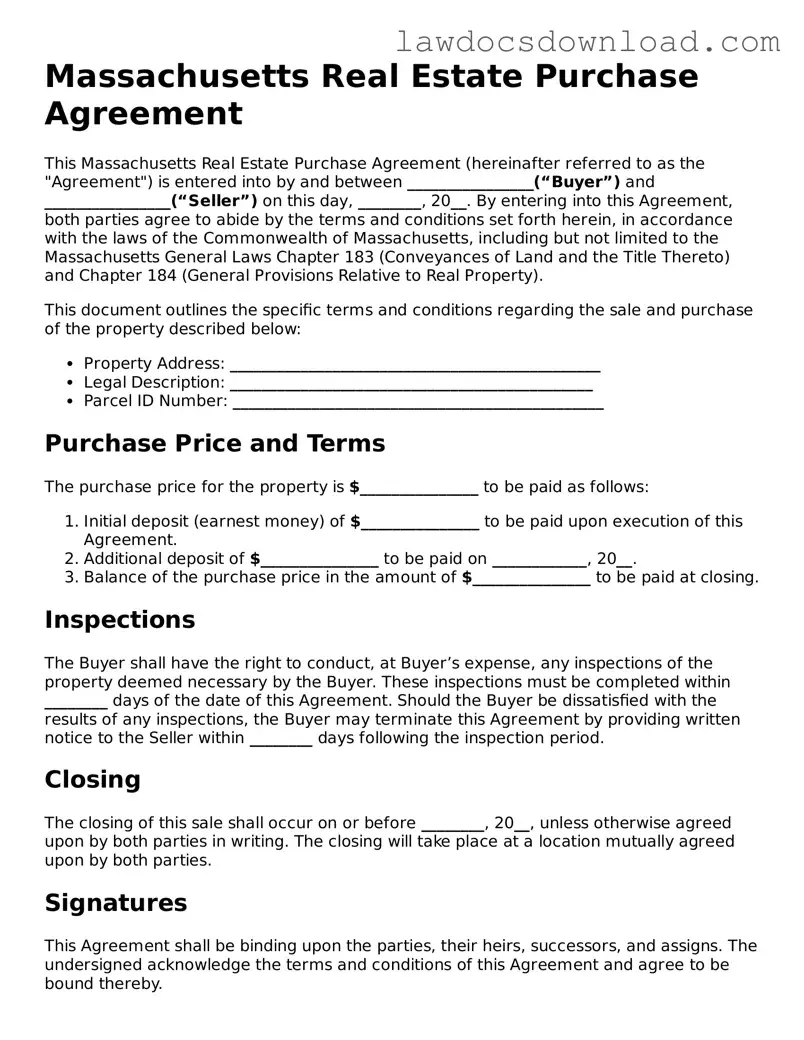The Residential Lease Agreement shares similarities with the Massachusetts Real Estate Purchase Agreement, primarily in its function of outlining terms between two parties. It focuses on the arrangement between a landlord and a tenant for the rental of property, including details such as lease duration, rent amount, and responsibilities of each party. Though one pertains to buying and the other to renting, both documents serve to define the rights and obligations of each party in a real estate transaction.
A Bill of Sale is akin to the Real Estate Purchase Agreement since both serve as formal documents to transfer ownership of property (real estate for the latter and personal property for the former) from one party to another. The key difference is in the type of property covered, yet both documents include detailed information about the parties involved, the property, and any warranties or guarantees.
The Land Contract is closely related to the Real Estate Purchase Agreement in that it is another method of buying and selling real estate. The Land Contract allows the buyer to pay the seller for the property over time, with the deed transferring upon the completion of payments. Both documents lay out the terms of the sale, including payment schedules, interest, and what happens in case of default.
The Property Management Agreement is similar to the Real Estate Purchase Agreement to the extent that it involves real estate and outlines a legally binding agreement between two parties. In this case, it governs the relationship between a property owner and a manager, specifying duties, financial arrangements, and other operational details. Though one is for managing and the other for purchasing, both formalize expectations and responsibilities concerning real estate.
An Earnest Money Agreement often accompanies a Real Estate Purchase Agreement, underscoring its complementary nature. This document outlines the initial deposit made by a buyer to show their serious intention to complete the purchase. It defines conditions under which the earnest money can be refunded or will be forfeited. Both documents are crucial steps in the real estate transaction process, ensuring commitment to the transfer of ownership.
The Co-ownership Agreement, while distinct, shares a foundational similarity with the Real Estate Purchase Agreement in dealing with the ownership of real estate. This agreement is typical among individuals who own property together without a business entity, detailing their rights, responsibilities, and the division of expenses and use of the property. Both agreements aim to prevent disputes by documenting the terms of ownership and use.
The Deed of Trust is a document that typically comes into play alongside the Real Estate Purchase Agreement, especially in transactions involving financing. It involves three parties: the borrower, the lender, and the trustee, and serves to secure the loan by placing the property title in trust until the loan is paid off. While the Purchase Agreement facilitates the sale, the Deed of Trust ensures the property can be used as collateral for the purchase financing.
A Home Inspection Report, while not a contract, is closely tied to the Real Estate Purchase Agreement process. It provides a thorough examination of the property’s condition prior to purchase, offering vital information that can influence the agreement’s terms. It might result in adjustments to the sale price, or conditions that must be met before the sale can proceed, making it a critical document in ensuring the property meets the buyer’s expectations.
The Title Insurance Policy is fundamentally connected to the process initiated by the Real Estate Purchase Agreement. It protects the buyer (and the lender) from any future disputes over the property’s title, ensuring that the buyer has clear ownership. While the Purchase Agreement arranges for the transfer of property from seller to buyer, the Title Insurance guarantees the legitimacy of that transfer, safeguarding against claims on the property.
Lastly, the Mortgage Agreement often goes hand-in-hand with the Real Estate Purchase Agreement, particularly in purchases where the buyer does not pay the full price upfront. It outlines the terms of the loan used to buy the property, including repayment schedule, interest rates, and the rights of the lender. While the Purchase Agreement secures the deal between buyer and seller, the Mortgage Agreement secures the financial aspect of purchasing the property.

